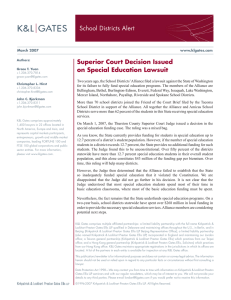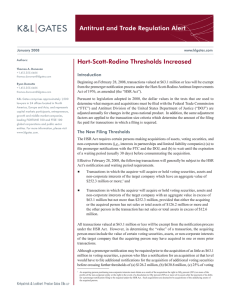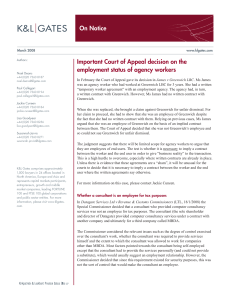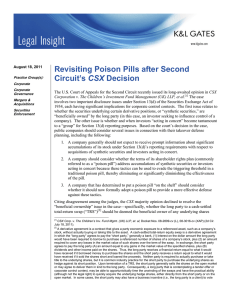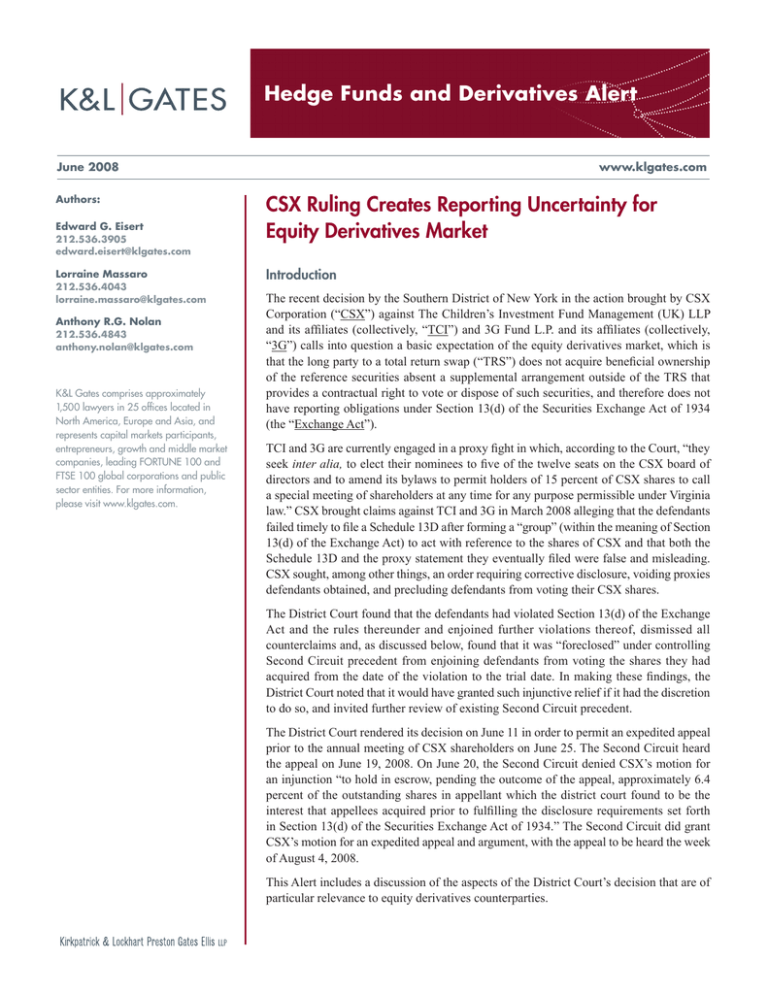
Hedge Funds and Derivatives Alert
June 2008
Authors:
Edward G. Eisert
212.536.3905
edward.eisert@klgates.com
Lorraine Massaro
212.536.4043
lorraine.massaro@klgates.com
Anthony R.G. Nolan
212.536.4843
anthony.nolan@klgates.com
K&L Gates comprises approximately
1,500 lawyers in 25 offices located in
North America, Europe and Asia, and
represents capital markets participants,
entrepreneurs, growth and middle market
companies, leading FORTUNE 100 and
FTSE 100 global corporations and public
sector entities. For more information,
please visit www.klgates.com.
www.klgates.com
CSX Ruling Creates Reporting Uncertainty for
Equity Derivatives Market
Introduction
The recent decision by the Southern District of New York in the action brought by CSX
Corporation (“CSX”) against The Children’s Investment Fund Management (UK) LLP
and its affiliates (collectively, “TCI”) and 3G Fund L.P. and its affiliates (collectively,
“3G”) calls into question a basic expectation of the equity derivatives market, which is
that the long party to a total return swap (“TRS”) does not acquire beneficial ownership
of the reference securities absent a supplemental arrangement outside of the TRS that
provides a contractual right to vote or dispose of such securities, and therefore does not
have reporting obligations under Section 13(d) of the Securities Exchange Act of 1934
(the “Exchange Act”).
TCI and 3G are currently engaged in a proxy fight in which, according to the Court, “they
seek inter alia, to elect their nominees to five of the twelve seats on the CSX board of
directors and to amend its bylaws to permit holders of 15 percent of CSX shares to call
a special meeting of shareholders at any time for any purpose permissible under Virginia
law.” CSX brought claims against TCI and 3G in March 2008 alleging that the defendants
failed timely to file a Schedule 13D after forming a “group” (within the meaning of Section
13(d) of the Exchange Act) to act with reference to the shares of CSX and that both the
Schedule 13D and the proxy statement they eventually filed were false and misleading.
CSX sought, among other things, an order requiring corrective disclosure, voiding proxies
defendants obtained, and precluding defendants from voting their CSX shares.
The District Court found that the defendants had violated Section 13(d) of the Exchange
Act and the rules thereunder and enjoined further violations thereof, dismissed all
counterclaims and, as discussed below, found that it was “foreclosed” under controlling
Second Circuit precedent from enjoining defendants from voting the shares they had
acquired from the date of the violation to the trial date. In making these findings, the
District Court noted that it would have granted such injunctive relief if it had the discretion
to do so, and invited further review of existing Second Circuit precedent.
The District Court rendered its decision on June 11 in order to permit an expedited appeal
prior to the annual meeting of CSX shareholders on June 25. The Second Circuit heard
the appeal on June 19, 2008. On June 20, the Second Circuit denied CSX’s motion for
an injunction “to hold in escrow, pending the outcome of the appeal, approximately 6.4
percent of the outstanding shares in appellant which the district court found to be the
interest that appellees acquired prior to fulfilling the disclosure requirements set forth
in Section 13(d) of the Securities Exchange Act of 1934.” The Second Circuit did grant
CSX’s motion for an expedited appeal and argument, with the appeal to be heard the week
of August 4, 2008.
This Alert includes a discussion of the aspects of the District Court’s decision that are of
particular relevance to equity derivatives counterparties.
Hedge Funds and Derivatives Alert
Beneficial Ownership Under Section 13(d)
In deciding the case, the District Court proceeded
cautiously and strictly limited its findings to the facts
presented, taking into account the position of the
Securities and Exchange Commission’s Division of
Corporate Finance (the “Division”), expressed in a
letter to the District Court, to the effect that “there is
no beneficial ownership where the short counterparties
buy, sell, or vote their hedge shares as a result of their
own economic incentives and not pursuant to legal
obligations owed to their long counterparties.” The
District Court noted that the Division did not comment
on the facts of the case, but that it nonetheless expressed
the concern that a contrary ruling would be novel and
upset settled expectations of the market.
In rendering its opinion, the Court found that it was not
necessary to reach the question whether the defendants
had acquired “beneficial ownership” under Rule
13d-3(a) because of its finding that the defendants
had used the TRSs with the “purpose and effect of
preventing the vesting of beneficial ownership of the
referenced shares . . . as part of a plan or scheme to
evade the reporting requirements of Section 13(d)
[under Rule 13d-3(b)]”. Among factors relevant to
the District Court’s conclusion were its findings that
TCI acquired its derivatives exposures while planning
a proxy fight with management of CSX, that a senior
official of TCI, in a conversation with a CSX officer,
“stated that TCI ‘owned’ 14 percent of CSX”s and that
TCI dispersed its swap contracts in such a way as to
avoid having any of its counterparties become subject
to a Section 13(d) reporting obligation.
Implications for Equity Derivatives Markets
and Regulation
While the District Court’s decision regarding beneficial
ownership under Section 13(d) was limited to the facts
of the case, its holding that TCI should be considered
a beneficial owner of the referenced shares for its
TRS transactions for disclosure purposes has troubling
implications for hedge funds and other end-users of
equity derivative instruments. Not the least of these
is that by finding that the defendants were beneficial
owners under Rule13d-3(b), the Court inferred that
the use of TRSs by “activist investors” raises the
spectre that such transactions might be indicia of a
plan or scheme to evade the reporting requirements
of Section 13(d) and must be examined in each case.
This inference, in turn, is based on the District Court’s
judicial notice of market practice that has led it to
conclude that swap dealers generally hedge their short
exposures to cash-settled equity swaps by directly
acquiring the referenced shares and make the hedging
shares available to the dealer’s long counterparty upon
the unwinding of the swap.
Another troubling aspect of the District Court’s decision
is that it does not appear to reconcile its holding under
Section 13(d) with Section 3A of the Exchange Act,
which forbids the Securities and Exchange Commission
from taking actions that impose registration and
reporting requirements with regard to security-based
swap agreements, except as expressly permitted by
Section 16 of the Exchange Act. To the extent that
Section 3A, which was added to the Exchange Act by
the Commodity Futures Modernization Act of 2000,
reflects the intent of Congress to exempt securitybased swaps from securities regulation, except for
specific exceptions limited to the prevention of fraud,
insider trading, and market manipulation, the basis of
Exchange Act jurisdiction may be open to question.
We note in this regard that the Division’s letter cited
above expresses the intent of the Division to consider
proposed rules to address equity swaps directly. It
would appear that any such rulemaking exercise would
have to be carefully considered in order to avoid
violating Section 3A.
Remedy
The District Court enjoined further violations of
Section 13(d). However, notwithstanding its judgments
regarding beneficial ownership of the referenced
shares, the District Court ultimately concluded that
it lacked discretion to “sterilize” the voting power of
the shares that were acquired before a Schedule 13D
was ultimately filed, because under Second Circuit
precedent the facts did not support a finding that either
CSX or other shareholders had suffered irreparable
harm. The District Court noted that “Second Circuit
cases go so far as to suggest, in dicta, that irreparable
harm can not be established once corrective disclosure
June 2008 | 2
Hedge Funds and Derivatives Alert
is made.” However, the District Court invited further
examination of the governing law by observing that the
Second Circuit has left open the possibility of finding
irreparable harm despite corrective disclosure . . .
where a defendant has ‘obtained a degree of control’
as a result of purchases made before it has complied
with [Section] 13(d).”
Conclusion
Pending the outcome of an appeal, at a minimum, the
decision cautions against “activist investors” entering
into TRSs under circumstances from which a court
could infer that the avoidance of reporting beneficial
ownership is a primary objective. The District Court’s
finding that the facts supported a finding that the
defendants entered into TRS transactions in order to
avoid a reporting obligation under Section 13(d) could
have wide legal effect; however, the better reading of
the decision would limit its holdings to its facts.
K&L Gates comprises multiple affiliated partnerships: a limited liability partnership with the full name Kirkpatrick & Lockhart Preston Gates Ellis LLP
qualified in Delaware and maintaining offices throughout the U.S., in Berlin, in Beijing (Kirkpatrick & Lockhart Preston Gates Ellis LLP Beijing
Representative Office), and in Shanghai (Kirkpatrick & Lockhart Preston Gates Ellis LLP Shanghai Representative Office); a limited liability partnership
(also named Kirkpatrick & Lockhart Preston Gates Ellis LLP) incorporated in England and maintaining our London and Paris offices; a Taiwan general
partnership (Kirkpatrick & Lockhart Preston Gates Ellis) which practices from our Taipei office; and a Hong Kong general partnership (Kirkpatrick &
Lockhart Preston Gates Ellis, Solicitors) which practices from our Hong Kong office. K&L Gates maintains appropriate registrations in the jurisdictions
in which its offices are located. A list of the partners in each entity is available for inspection at any K&L Gates office.
This publication/newsletter is for informational purposes and does not contain or convey legal advice. The information herein should not be used or
relied upon in regard to any particular facts or circumstances without first consulting a lawyer.
Data Protection Act 1998—We may contact you from time to time with information on Kirkpatrick & Lockhart Preston Gates Ellis LLP seminars and
with our regular newsletters, which may be of interest to you. We will not provide your details to any third parties. Please e-mail london@klgates.
com if you would prefer not to receive this information.
©1996-2008 Kirkpatrick & Lockhart Preston Gates Ellis LLP. All Rights Reserved.
June 2008 | 3

